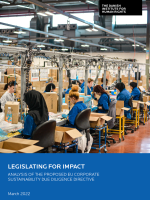
Legislating for impact: analysis of the proposed EU corporate sustainability due diligence directive
This briefing analyses the proposal to both inform public debate and support policy development and is of relevance to policy makers, as well as civil society in the EU and outside of the EU.
The briefing examines foundational aspects such as personal and material scope, how the proposal treats business relationships and the scope of due diligence across the value chain, use of contractual assurances as well as enforcement and liability. It then goes on to consider each element of the due diligence obligation, from policy commitments and governance to identification, addressing actual or potential impacts, monitoring, communication and access to remedy. For each issue and element, the briefing asks and examines:
- What does the proposal say?
- Does it have the potential to effectively address corporate human rights impacts?
- How can it be strengthened?
The briefing notes that proposal contains a number of ambitious aspects, as it covers impacts across the full value chain, includes provisions on enforcement and civil liability and has the potential to have a significant positive impact for people and planet. However, the restricted number of companies in scope and provisions limiting the extent of the due diligence obligation including by suggesting reliance on contractual means to exercise this due diligence, and other deviations from the international frameworks mentioned above risk undermining its effectiveness as well as the legal certainty it sets out to create.
We strive to make the pdf versions of our publications etc. accessible for screen readers. If you experience any problems, please contact Digital Editor Stine Juhl Nielsen on stni@humanrights.dk
